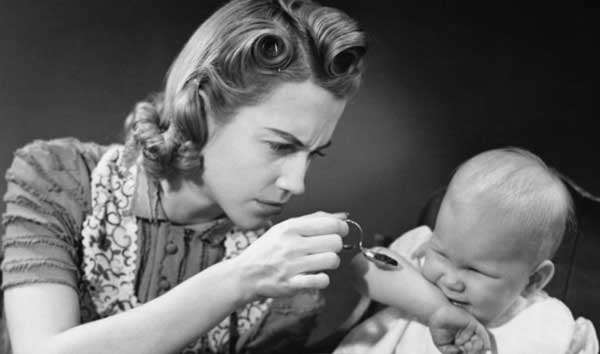
Why the “My Kids Turned Out Just Fine” Argument is Invalid
How many times have you argued with your parents or in-laws about how to take care of your kids? I can remember numerous heated discussions with my mother-in-law in particular when my children were infants. She just didn’t understand all the current parenting rules. Why do they have to sleep on their back? Why can’t they have a blanket in their crib? Why can’t they eat that food yet? She often said, “I didn’t follow any of these rules and my kids grew up just fine.”
Well, it turns out that these disagreements should not be taken lightly and modern parents should stand their ground. A recent study from Northwell Health, New York State’s largest health care provider, warns that grandparents who practice outdated health guidelines – sometimes based on myths and old wives’ tales – can put their grandchildren’s safety at risk.
As of 2012, more than seven million grandchildren in the United States are being raised by nearly three million grandparents, according to the U.S. Census Bureau. This trend is due to factors including the opioid epidemic, parental incarceration, or problems with parents’ physical or mental health. This number does not even include many of us who are raising our children but still rely on our parents to watch our kids while we’re at work, out of town, or even out on an occasional Saturday night. However, a lot has changed over the decades since these grandparents were parents themselves, so it is critical for them to keep up with the latest pediatric guidelines.
The study was conducted by surveying 636 grandparents in the United States. Researchers were shocked at how many health-related questions the grandparents responded to incorrectly. One issue highlighted in the study is that 44 percent of the respondents mistakenly believed that ice baths are a good way to bring down a very high fever. In reality, ice baths pose a hypothermia risk.
Another major concern involved sleep guidelines. Almost a quarter of the grandparents in the study did not know that infants should be put to sleep on their back, not on their stomach or side, to prevent sudden infant death syndrome (SIDS). When asked whether scrapes or cuts heal better with or without a bandage, 68 percent of grandparents did not know that wounds should be covered.
Staying up to date with new parenting advice can be quite challenging, especially in this fast-paced technological society. With every new Facebook post or breaking news story, parents need to evaluate how that information impacts their children. So it’s understandable that grandparents might have difficulty keeping up.
If your parents are helping to take care of your kids, then it’s critical to build a positive, working relationship with them so that you can feel comfortable leaving your precious ones in their hands, and they can feel confident that they are doing everything properly. It’s really our responsibility to continuously educate the grandparents about the latest guidelines, and their duty to be willing to listen and learn even if it contradicts how they raised us years ago.
If you know that your parents will be involved from the beginning then start getting them educated about the latest parenting do’s and don’ts while you’re pregnant. Here are some ways to keep the grandparents involved and in-the-know so that they have the tools they need to successfully care for their grandchildren in this day and age.
- Take grandparents shopping with you to purchase or register for all the baby equipment. Spend the time to explain why your baby needs these items and how they work. For example, when we were kids, we were not strapped into a rear-facing five-point harness car seat.
- Buy your parents special books about being a grandparent or copies of the parenting books you’re relying on.
- Bring grandparents along for parenting and baby safety classes offered at your local hospital, community center, or baby store.
- Once the baby is born, invite the grandparent caring for your child to pediatrician appointments so they can hear firsthand what the doctor recommends. Give them a chance to ask questions as well.
- Introduce the grandparents to the same resources you’re referring to for the latest child safety news, such as the American Academy of Pediatrics’ Healthy Children websiteand Baby Center.
By Sandi Schwartz





